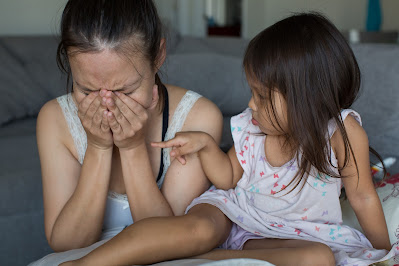Many clients who come to see me for unresolved trauma grew up as parentified children (see my article: What is the Impact of Parentification on Adult Relationships?).
What Are Parentified Children?
Parentification is a role reversal between parents and children.
Parentified children are children who grew up taking on adult responsibilities in their family.
These responsibilities might include:
- Providing emotional support to their parents
- Taking care of younger siblings as a regular part of their chores
- Taking on major household chores that are normally done by adults
- Taking on the stress of financial problems and other major stressors in the family
- Mediating arguments between their parents and/or other adult family members
- Paying bills
- Making doctor's appointments, and so on
This often occurs when children's parents either can't or won't assume parental responsibilities and they might also unable to take care of themselves.
What Are the Signs of Parentification?
Some of the signs of parentification include:
- Children being praised by their parents and other adults for being "so good" or "so responsible" when they take on tasks beyond their developmental stage
- Children feeling they have to be the peacemakers in the family
- Getting in trouble with their parents when they wanted to engage in children's activities because parents wanted them to stay home to take care of adult responsibilities
- As an adult not being able to remember being allowed to be a child
- As an adult feeling they were given responsibilities beyond their capacity as a child
- As an adult feeling they had to "grow up fast" (beyond their developmental capacities)
- As an adult only feeling comfortable in the role of a caretaker to a partner or spouse
- As an adult feeling they have to be so "self reliant" to the point of not trusting others, including significant others, to come through for them
Why Causes Parentification?
Parentification can occur for many reasons.
In many instances the parents of parentified children grew up as parentified children themselves so it seems normal and familiar to them.
Since they were parentified children, these parents might never have learned to manage their emotions because they were preoccupied with taking care of their parents' emotions.
As a result, it's not unusual to find a long history of parentified children from one generation to the next.
In other instances parents might have mental health or substance abuse problems and they are unable to take on parental responsibilities so one or more of their children take on these responsibilities.
Why is Parentification Traumatic?
Parentified children often feel they are special when they are children because they feel they are helping their parents and often get complimented for it. But, as adults, they might begin to sense that something didn't go right when they were children (see my article: Why is Past Trauma Affecting You Now?).
For instance, when they hear other adults talk about their childhood, many adults who grew up as parentified children sense they missed out on being a child. For many people this is the beginning of their questioning why they took on their parents' responsibilities and what affect it might have had on them (see my article: How Developmental Trauma Affects How You Feel About Yourself).
Parentification also causes the disruption of the child's natural maturational process which often leads to negative consequences for their long term health and mental health including anxiety and depression and chronic health problems.
In addition, as previously mentioned, parentification often develops into intergenerational trauma as the trauma is perpetuated from one generation to the next.
How Can You Heal From the Trauma of Parentification?
There are specific types of therapy, known as trauma therapy, for parentification and other types of developmental trauma:
EMDR Therapy (Eye Movement Desensitization and Reprocessing)
Ego States Therapy (similar to Internal Family Systems Therapy or Parts Work Therapy)
AEDP (Accelerated Experiential Dynamic Psychotherapy)
Getting Help in Trauma Therapy
Parentification is more common than you might think.
Even though parentification might have been normalized in your family, you might realize it had a negative emotional impact on you.
Rather than struggling on your own, seek help from a qualified trauma therapist so you can overcome trauma and lead a more fulfilling life.
About Me
I am a licensed New York psychotherapist, hypnotherapist, EMDR, AEDP, EFT, Somatic Experiencing and Sex Therapist.
As a trauma therapist with over 20 years of experience, I work with individual adults and couples to help them overcome trauma.
To find out more about me, visit my website: Josephine Ferraro, LCSW - NYC Psychotherapist.
To set up a consultation, call me at (917) 742-2624 during business hours or email me.






























.jpg)












